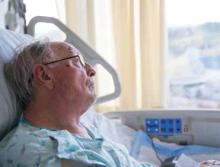GPHAP Student Hotspotting
An interdisciplinary approach to caring for patients with complex needs
By William Harms
VOLUME 24 | ISSUE 2 | SUMMER 2017
A disproportionate amount of care and expense at many hospitals comes as a result of treating a relatively small number of patients with multiple, complicated conditions.

Those conditions are frequently impacted by social and psychological factors, something that SSA students are learning more about through their participation in The Interprofessional Student Hotspotting Learning Collaborative, a six-month national program, in which interdisciplinary teams meet with patients with complex medical and social needs to better understand those needs.
“There is no one, simple statistic that explains the disproportionate expense, but we know that 85 percent of the costs for Medicare come from 25 percent of the patients,” says Dr. David Meltzer, Professor of Medicine, Economics and Public Policy and Principal Investigator of the Comprehensive Care Program. The Medicare-funded study at University of Chicago Medicine established a team of physicians and other health professionals who see people with complicated conditions in both the clinic and the hospital.
The problem with heavy use of medical services by a mall number of people is something researchers have known about for a long time, but the Hotspotter program is valuable as it provides students a way of learning about how social and psychological conditions are related to the problem, he said.
The hotspotting student program at the University links students from SSA, the Harris School of Public Policy, the Chicago Booth School of Business, and the UChicago Pritzer School of Medicine with clinical mentorship from the Comprehensive Care Program team. It is part of a national program that is sponsored by the Camden Coalition of Healthcare Providers, the Association of American Medical Colleges, and Primary Care Progress.
“The students get to know and understand the patients, the complexities of the healthcare system, and the issues that patients and their families face. The students receive training and experience in interdisciplinary teamwork as part of the program,” says Laura Botwinick, Director of Graduate Program in Health Administration and Policy (GPHAP), who helps oversee the program. “It is a natural fit for GPHAP, as our work is interdisciplinary.”
GPHAP, which is based at SSA, enrolls students who earn either a Certificate in Health Administration and Policy or a Certificate in Health Administration and Policy with a Concentration in Global Health, while earning a degree at SSA, the Booth School of Business, the Harris School of Public Policy, the Law School, or the Pritzker School of Medicine.
The hotspotting collaborative, funded by the GPHAP Arthur Quern endowment, provides education and support to teams as they connect with patients, learn about the causes of high health care utilization, and share this learning with their institutions. Teams participate in online curriculum and monthly case conferencing, and receive mentoring and a curriculum learning guide.
“This program builds bridges for our students who benefit from working with students from SSA,” says Dr. Vineet Arora, Assistant Dean for Scholarship and Discovery, who helps direct the program at the Pritzker School of Medicine. “So much of health care is connected to social issues like housing, access to water, and social support.” Learning about those issues enhances the education of the medical students.
SSA students also benefit from contact with the medical school students by gaining a perspective on the medical discipline as they learn how health care interacts with conditions of chronic illness, loneliness, and mental health, she says. SSA students involved in the program say that collaboration helps them better understand how people with complicated conditions access healthcare.
“The interdisciplinary team was really useful because I think it’s easy to get wrapped up in the ideals brought by any one perspective. But in the real world, those ideals need to be preserved but also work alongside and with the ethics, ideals, and realities of many other perspectives and professions,” explains Kathryn West, AM '17. “It was a great way to learn about the strengths of social work and where that lens can be useful, but also when other lenses need to take priority in order to have the best patient care possible.”